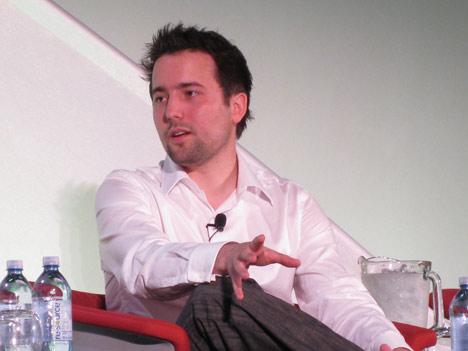Recycling is big business

RX3, Ireland’s first ever conference on recycling industries and initiatives, was held in Dublin recently. Politico went along to hear the key-note speaker,the founder and CEO of Terracycle and America’s foremost eco-capitalist Tom Szaky, talk about his revolutionary concept: recycling as big business. By Edward O’Hare.
It all started with worm excrement. Eight years ago Tom Szaky the head of Terracycle, the fastest-growing and most lucrative green industry in the world, was just another guy trying to nurture a couple of cannabis plants in his basement. When Szaky left home he put his precious plants in the care of a few friends.
(Picture: Tom Szaky)
At first frustrated at the plant’s poor health, Szaky’s friends suddenly stumbled upon the solution: worm excrement. This humble material proved an incredibly rich fertilizer and before long Szaky was back with his friends raiding canteens for waste food for the worms to eat. Within six months Terracycle became a legitimate business and was all ready to enter the market place when it hit a snag.
Looking for environmentally-friendly packaging to go with their organic fertilizer, Szaky and his friends were dismayed to find that recycled plastic bottles were more expensive than new ones, something that would make their product too costly. Then Szaky had a brainwave. It occurred to him that millions of plastic bottles which he could use immediately were being dumped into landfills across America. The stratagem he came up with was to open depots in community centres for people to leave their unwanted packaging. Each of these centres, schools, universities, churches, then named a charity to which Terracycle made a donation. In no time Walmart offered Terracycle a contract and its organic fertilizer was on the shelves of supermarkets in every city in America.
From here Terracycle could only expand. Szaky had struck upon the unimaginable potential of material which had previously been given only a negative fiscal value. A huge percentage of the packaging going into landfills is made of simple polymers, plastics which can easily be converted into different forms. Soon Terracycle was turning millions of juice pouches into schoolbags, plastic furniture, bin-bags and other household products.
It didn’t take long before Kraft, Kellogs and other mega-brands hired Terracycle to do away with the perception that they were callous polluters, prepared to destroy the planet to make gross profits. At the simplest level, what Szaky and his buddies managed to do was make recycling cool.
Now, as the keynote speaker at RX3 (Rethink, Recycle, Remake), Ireland’s first ever international conference on recycling initiatives, Szaky outlines his vision for how the green economy needs to develop. What’s needed, he believes, is to look again at the question ‘what is garbage’ and re-evaluate the whole concept of consumption. The reason his company has prospered so phenomenally is that it takes the view that landfills are just poorly managed warehouses which, when their components are properly sorted, can be seen as possessing tremendous value. Once this is done an outlet can be found for every waste stream the sorting process produces.
Terracycle, which makes 1,500 products out of waste and is starting operations in a new country every month (it shall open it‘s first collection centre in Ireland later this month), is proof that by changing the public and private perception of waste, and creating a demand for it, employment can be generated and the enormous garbage problem can be eliminated.
Dishevelled, dressed in a crumpled hoody but with a energetic glitter in his eye, the 28 year-old billionaire Szaky talks about recycling for nearly an hour without notes and with the irrepressible enthusiasm of someone who has mastered a tricky computer game and can barely contain their excitement. “There is a huge will on the part of people to good” he maintains.
His words confirm the view of Pat Macken, the head of the Environment International and Sustainable Development Unit in the Department of the Environment. What’s required, he holds, is a mechanism to encourage upscaling, taking recyclable waste and not just turning it back into raw materials but making it into high quality products which can compete with market rivals. Ireland has gone from recycling 15% of packaging waste in 1998 to 65% in 2009. What is necessary now is a programme for establishing businesses that make the full use of this resource.
Exhibiting at the RX3 conference are several Irish companies already doing this, including manufacturers of curb stones, decking, slates and piping, all made from upscaled plastic.
Most impressive is Bioplastech which reclaims new products from plastics, including a fuel, using technology invented by it’s founder, Dr. Kevin O’Connor. “It’s all about getting the maximum out of what you have,” says Dr. O’Connor. It has taken him ten years to get his company up and running but he quotes the scientist Howard Aitken’s comment that a true innovator should never be afraid of people stealing their ideas because “if it’s original you will have to cram it down their throats.”
Ultimately what all the contributors at the RX3 conference agree on is that Ireland’s government and commercial sector must look away from the short-term costs of being green to the long-term ones.
If they don’t all of us will pay the price.
